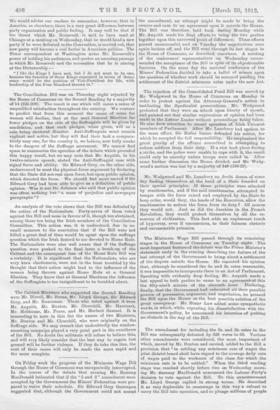The Conciliation Bill was on Thursday night rejected by the
House of Commons on the Second Reading by a majority of 14 (222-208). The result is one which will cause a sense of unqualified satisfaction throughout the country. We venture to predict that from this moment the cause of votes for women will decline, that at the next General Election far fewer pledges on the side of the Suffragists will be given by candidates, and that such pledges, when given, will as a rule bring electoral disaster. Anti-Suffragists must remain vigilant and active, but they will find their task a compara- tively easy one, for the country is, we believe, now fully awake to the dangers of the Suffrage movement. We cannot find space to summarize the speeches of the debate which preceded this happy result, but we may note that Mr. Asquith, in his twelve-minute speech, stated the Anti-Suffragist case with signal force and ability. Sir Edward Grey, on the other side, endeavoured to meet the physical-force argument by declaring that the State did not rest upon force, but upon public opinion, which directed the force. We should feel more moved if Sir Edward Grey had been able to give us a definition of public opinion. Was it not Dr. Johnson who said that public opinion was often nothing but "a mass of prejudice and newspaper paragraphs "P






































 Previous page
Previous page